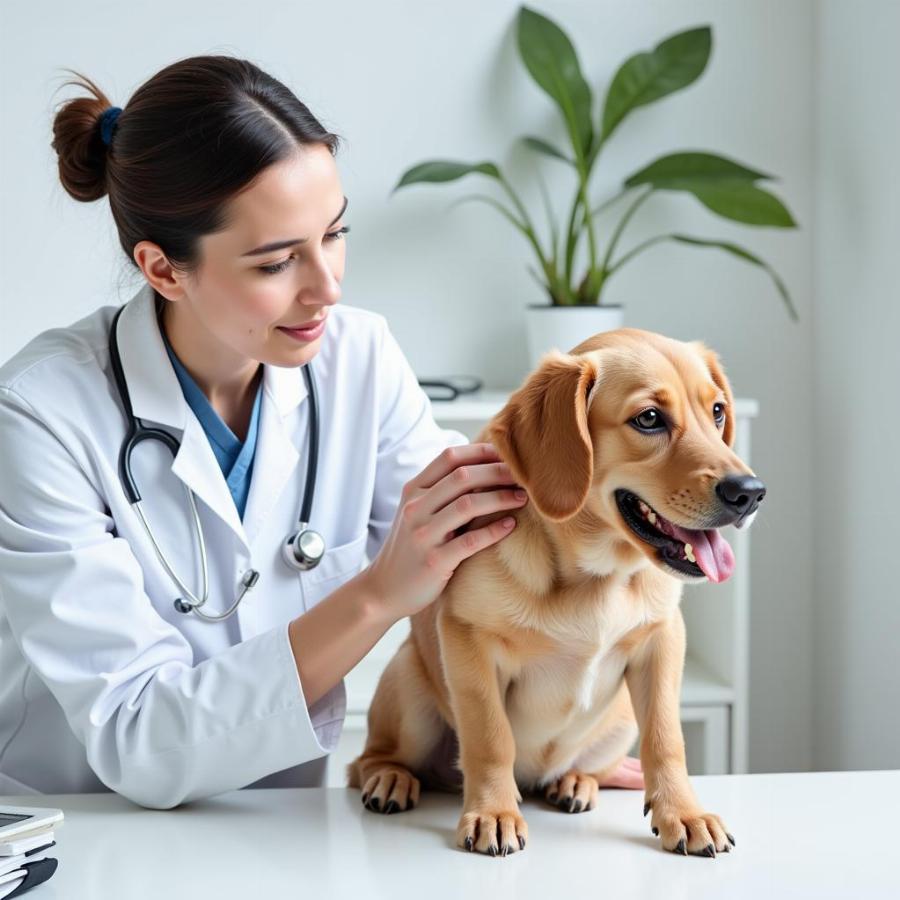Ramen noodles are a quick, cheap, and satisfying meal for humans, but can our canine companions enjoy this popular dish? The short answer is no, dogs should not eat ramen noodles. While a small amount likely won’t cause immediate harm, ramen is not a nutritionally sound food for dogs and can even pose some health risks. Let’s explore why ramen noodles are a no-go for your furry friend.
Why Ramen Noodles Aren’t Good for Dogs
Ramen noodles are primarily made from refined wheat flour, which offers little nutritional value for dogs. They are high in carbohydrates and sodium, both of which can be detrimental to a dog’s health in large quantities. Excess sodium can lead to dehydration, increased thirst, and even sodium ion poisoning in severe cases. While carbohydrates provide energy, the refined carbs in ramen offer little beyond empty calories. Additionally, many ramen noodle flavor packets contain ingredients like garlic and onion powder, which are toxic to dogs.
What about the broth? While a tiny taste of the sodium-laden broth is unlikely to harm your dog, it’s best to avoid it entirely. High sodium levels can exacerbate existing health conditions like heart and kidney disease.
What Happens if a Dog Eats Ramen Noodles?
If your dog sneaks a few noodles, don’t panic. A small amount is unlikely to cause serious harm. However, watch for signs of gastrointestinal upset such as vomiting, diarrhea, or loss of appetite. If these symptoms persist or worsen, contact your veterinarian immediately. Ingesting a large amount of ramen, especially the seasoning packet, can be more serious. In these cases, seek veterinary attention immediately.
Healthier Alternatives to Ramen Noodles for Dogs
Instead of ramen, opt for dog-friendly treats and snacks that provide essential nutrients. Consider offering small pieces of cooked carrots, green beans, or apples as healthy alternatives. Always ensure any human food you give your dog is safe and offered in moderation.
Are There Any Types of Noodles Safe for Dogs?
While most noodles aren’t ideal for dogs, plain, cooked whole wheat pasta or brown rice noodles in small quantities can be offered occasionally. Avoid adding salt or sauces, as these can be harmful. Remember, these should be treats, not a meal replacement.
Can Dogs Eat Ramen Noodle Broth?
No, dogs should not eat ramen noodle broth. As previously mentioned, it’s very high in sodium which can cause a range of health problems from mild dehydration to severe complications like sodium ion poisoning.
 Veterinarian examining a dog
Veterinarian examining a dog
What Should I Feed My Dog Instead of Ramen?
High-quality dog food formulated for your dog’s age, breed, and activity level is the best option. This ensures they receive all the necessary nutrients for optimal health. Consult with your veterinarian for personalized dietary recommendations.
Conclusion
While the tempting aroma of ramen might pique your dog’s interest, it’s crucial to remember that this human food is not suitable for canine consumption. The high sodium content, lack of nutritional value, and potential for toxic ingredients make ramen a risky choice for your furry friend. Stick to a balanced diet of high-quality dog food and healthy treats to keep your dog happy and healthy.
FAQ
- What should I do if my dog accidentally eats ramen? Monitor them for any signs of gastrointestinal upset and contact your veterinarian if necessary.
- Can puppies eat ramen? Absolutely not. Puppies are even more susceptible to the negative effects of high sodium and unhealthy ingredients.
- Are instant noodles bad for dogs? Yes, all types of instant noodles, including ramen, are generally unhealthy for dogs due to their high sodium content and lack of nutritional value.
- What are some healthy snacks I can give my dog? Cooked carrots, green beans, apples, and plain cooked whole wheat pasta or brown rice noodles in small quantities are good choices.
- Can dogs eat flavored ramen noodles? No, avoid flavored ramen noodles, as the seasoning packets often contain ingredients toxic to dogs, such as garlic and onion powder.
- Why is sodium bad for dogs? Excessive sodium can lead to dehydration, increased thirst, and even sodium ion poisoning.
- What is the best food to feed my dog? High-quality dog food formulated for your dog’s age, breed, and activity level is the best choice.
Related Questions & Articles
- Can dogs eat egg noodles?
- What human foods are safe for dogs?
- Understanding dog nutrition
Beaut Dogs is your ultimate guide to the world of canine companionship. We provide expert advice, insightful articles, and a wealth of resources on dog breeds, care, training, nutrition, and more. Visit us at https://beautdogs.com and embark on a journey of discovery with your beloved pet. When you need support, contact Email: [email protected] to have Beaut Dogs provide detailed and accurate answers.